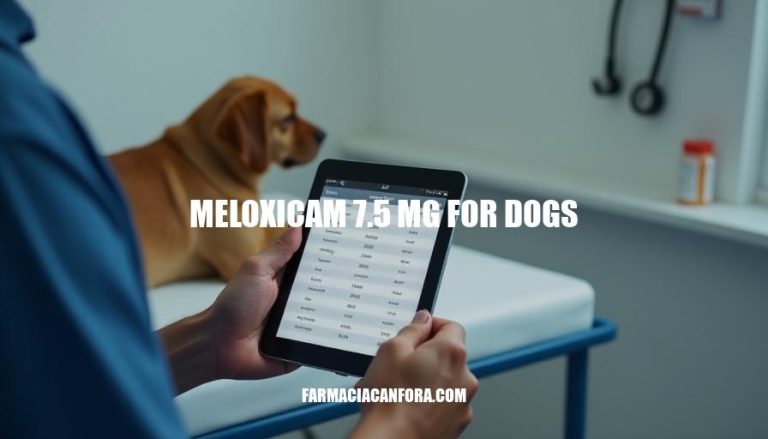


Meloxicam is a medicine that helps dogs feel better when they’re in pain. It’s often used for things like arthritis, after surgery, or if they’ve hurt themselves. It works by reducing the swelling and pain in their body.
You should talk to your vet before giving meloxicam to your dog.
They’ll help you figure out if it’s safe and right for them. Your vet will also tell you how much to give and watch for any potential problems, like stomach issues or kidney damage.
Just follow your vet’s advice to keep your pet happy and healthy!
Meloxicam is a nonsteroidal anti-inflammatory drug (NSAID) that works by inhibiting the production of prostaglandins, which are substances in the body that cause inflammation, pain, and fever. It is commonly used to relieve pain, inflammation, and stiffness associated with conditions such as osteoarthritis and rheumatoid arthritis in humans.
In veterinary medicine, meloxicam is frequently prescribed for dogs to manage pain and inflammation associated with osteoarthritis, soft tissue injuries, and post-surgical pain. It is available in various forms, including oral liquid, chewable tablets, and injectable solutions.
The most common side effects in dogs include gastrointestinal upset, such as vomiting and diarrhea. It is important to follow the veterinarian’s instructions carefully when administering meloxicam to dogs to minimize potential side effects.
The appropriate dosage of meloxicam 7.5 mg for dogs is typically 0.1 mg per pound of body weight. This means that a 75-pound dog would receive a 7.5 mg dose. However, it is crucial to consult with your veterinarian to determine the correct dosage for your dog, as factors such as weight, age, and overall health can affect the appropriate dose.
To administer meloxicam to your dog, follow these steps:
Shake the medication well before use if it is in liquid form.
Use the syringe or dropper that comes with the medication to measure the correct dose.
Mix the medication with your dog’s food or administer it directly into their mouth.
Give the medication with food to reduce the risk of gastrointestinal upset.
Administer the medication once a day, as prescribed by your veterinarian.
It is essential to follow your veterinarian’s recommendations closely when giving meloxicam to your dog.
Overdosing or incorrect administration can lead to serious side effects, including gastrointestinal issues, kidney or liver damage, and bleeding. Always consult your veterinarian if you have any concerns or notice any adverse reactions in your dog.
Remember, your veterinarian’s guidance is crucial for ensuring your dog’s safety and well-being while using meloxicam.
Meloxicam 7.5 mg is a non-steroidal anti-inflammatory drug (NSAID) that provides several benefits for dogs. It helps in reducing pain and inflammation associated with conditions like osteoarthritis, soft tissue injuries, and post-surgical pain. By alleviating pain, it improves mobility, allowing dogs to move more comfortably and engage in daily activities.
This enhanced mobility contributes to an overall improvement in quality of life, as dogs can enjoy a more active and fulfilling life. Additionally, meloxicam can help manage fever and inflammation from other sources, such as ear or skin infections.
Meloxicam 7.5 mg, a nonsteroidal anti-inflammatory drug (NSAID), is commonly prescribed for dogs to alleviate pain and inflammation. However, it can cause several side effects. Gastrointestinal issues such as vomiting, diarrhea, and loss of appetite are common.
Kidney damage, liver damage, and increased risk of bleeding are serious side effects that can occur. Allergic reactions, including facial swelling and difficulty breathing, may also happen. Behavioral changes like increased aggression or anxiety can be observed.
Monitoring your dog for any signs of these adverse reactions is crucial.
If you notice any unusual symptoms, consulting your veterinarian immediately is essential to ensure your dog’s health and safety.
Precautions:
Allergy: Avoid meloxicam if the dog has a known allergy to NSAIDs.
Liver and Kidney Disease: Do not use in dogs with pre-existing liver or kidney disease.
Bleeding Disorders: Avoid in dogs with bleeding disorders.
Dehydration: Do not use in dehydrated dogs.
Pregnancy and Lactation: Avoid in pregnant or lactating dogs.
Young Puppies: Do not use in dogs younger than 6 months old.
Other Medications: Avoid concurrent use with other NSAIDs, corticosteroids, or aspirin unless directed by a veterinarian.
Contraindications:
Vomiting or Bloody Stools: Do not use if the dog is vomiting or has bloody stools.
Poor Appetite: Avoid in dogs with poor appetite.
Alternative Options:
CBD Oil: Known for its anti-inflammatory properties.
Glucosamine and Chondroitin Supplements: Help rebuild cartilage and alleviate joint pain.
Turmeric and Boswellia: Natural anti-inflammatories.
Acupuncture and Hydrotherapy: Non-pharmacological pain relief options.
Always consult with a veterinarian before starting any new medication or supplement.
Meloxicam 7.5 mg is a nonsteroidal anti-inflammatory drug (NSAID) used to relieve pain, inflammation, and stiffness in dogs.
It’s commonly prescribed for conditions like osteoarthritis, soft tissue injuries, and post-surgical pain.
However, it can cause side effects such as gastrointestinal issues, kidney damage, liver damage, and increased risk of bleeding.
To ensure safe usage, consult with a veterinarian to determine the correct dosage based on your dog’s weight, age, and overall health.
Follow their instructions carefully to minimize potential side effects. Monitor your dog for any signs of adverse reactions and seek veterinary attention immediately if you notice unusual symptoms.
Precautions include avoiding use in dogs with allergies, liver or kidney disease, bleeding disorders, dehydration, pregnancy, lactation, young puppies, or concurrent use with other medications.
Contraindications include vomiting, bloody stools, or poor appetite.
Alternative options like CBD oil, glucosamine and chondroitin supplements, turmeric and boswellia, and acupuncture and hydrotherapy can be discussed with a veterinarian for non-pharmacological pain relief.